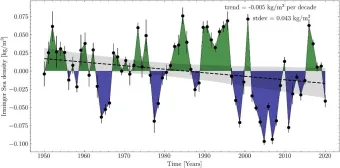
Leading scientists from the National Oceanography Centre (NOC) have discovered that the Atlantic Meridional Overturning Circulation (AMOC) is not showing a detectable decline as previous studies from other scientists have suggested. A decline in the AMOC would contribute to extreme weather and climate decline in North America and Europe.
The study, published in Geophysical Research Letters found that ocean density in the Irminger Sea east of Greenland explains most of the variability of the strength of the AMOC, a system of ocean currents that includes the Gulf Stream. In fact, the new data suggests that there is no evidence that the AMOC is experiencing a detectable decline in the strength of ocean currents over the past 70 years.
NOC scientists studied the subpolar North Atlantic (SPNA) Ocean between Greenland and Scotland, which is a region that is key to the health of the AMOC system. Here, warm currents carrying heat from the subtropics become cooler and denser, a process that has a strong imprint on the strength of this vital ocean current system.
Previous studies concluded that the AMOC was weakening, possibly due to the increase in freshwater from melting polar ice. If the AMOC and the Gulf Stream decline, it could have disastrous impacts on weather and climate in the US and Europe.
The NOC’s discovery highlights the significant impact that Atlantic Ocean currents are having on European weather. Professor Penny Holliday, Head of the Marine Physics and Ocean Climate group at the National Oceanography Centre, explains: “The Gulf Stream and the jet stream both influence weather, but in different ways. The Gulf Stream brings warmer water towards western Europe, making temperatures in Europe warmer than the same latitudes in Canada, and affecting the overall climate. The jet stream is more directly responsible for short-term variations in climate or weather. But changes in the ocean currents including the Gulf Stream can in turn force the jet stream to be either over the UK bringing wet and windy weather, or to the north of the UK giving us calm and settled weather.”
This process is directly linked to the strength of the vital ocean current system known as the Atlantic Meridional Overturning Circulation. Water flowing northwards in the Atlantic is high in salt because of evaporation which increases the salt concentration in the ocean. The water gradually cools as it is transported to the north, and because lower temperatures and high salt content make water denser and heavier, it sinks down deeper into the ocean. Sinking water causes more water to be pulled northwards and creates a stable flow. The amount of water that sinks determines the consistency and strength of the surface currents. If this process begins to slow down, the Gulf Steam will decline, subsequently impacting weather patterns and industrial trades such as fisheries.
Professor Holliday added: “Through this study we originally sought to understand the physics of the AMOC to improve confidence in climate projections – vital work which assesses which ocean models are working well, and which ones need improving. What was fascinating was that we discovered the AMOC system including the Gulf Stream is not yet becoming unstable or reaching a tipping point that could devastate climates across the world.
“The study shows that the area between Greenland and Scotland has clear importance for climate projections, and that processes happening in centre of the Subpolar Gyre are critical, rather than in the surrounding currents as previously thought. For the first time, we’ve shown the relationship between the temperature and salinity of water inside the gyre and the strength of large ocean currents.”
Scientists will be using this discovery to develop climate and weather models. Previous findings had acted to reduce confidence in climate projections, as key processes that determine the strength of ocean currents happen between Greenland and Scotland – whereas in many climate models, this strength is determined between Greenland and Canada.
Holliday continued: “There is no reason to assume that we are close to an overall shut down of the AMOC. While there is suggestive evidence for a slow-down of this system in the SPNA in recent decades, there is no indication of its relevance over longer timescales. We are confident that this discovery will provide a more accurate timeline of climate projections, as well as improve seasonal weather forecasts.”